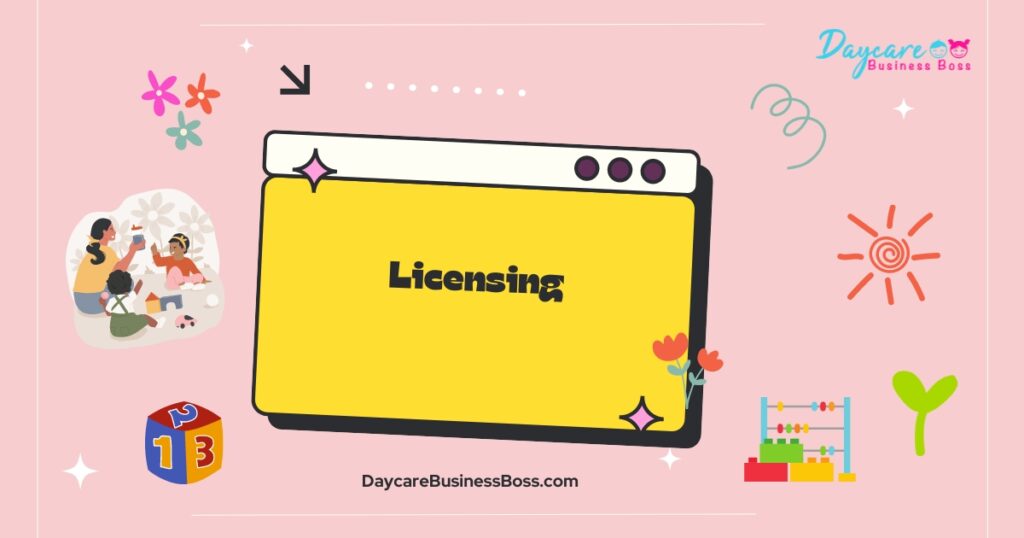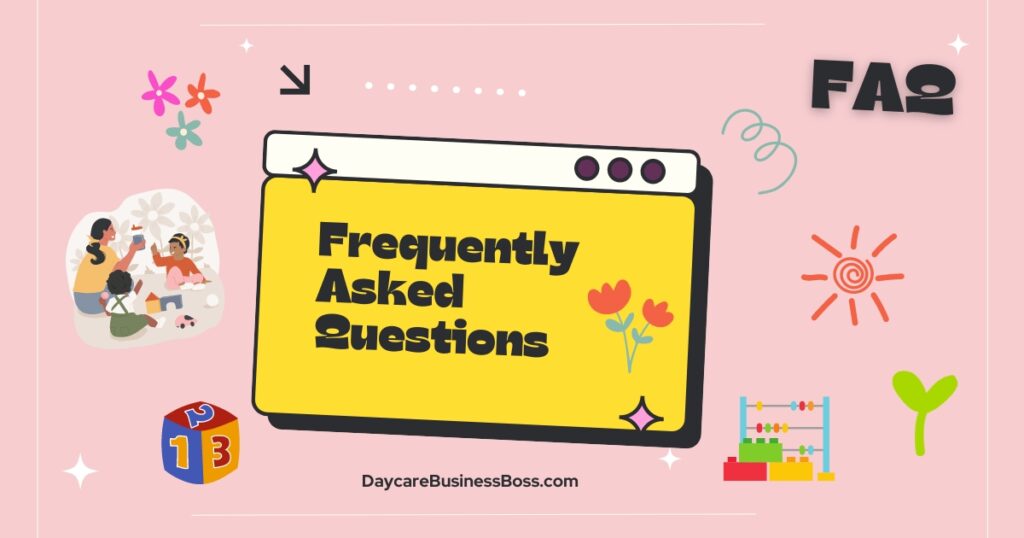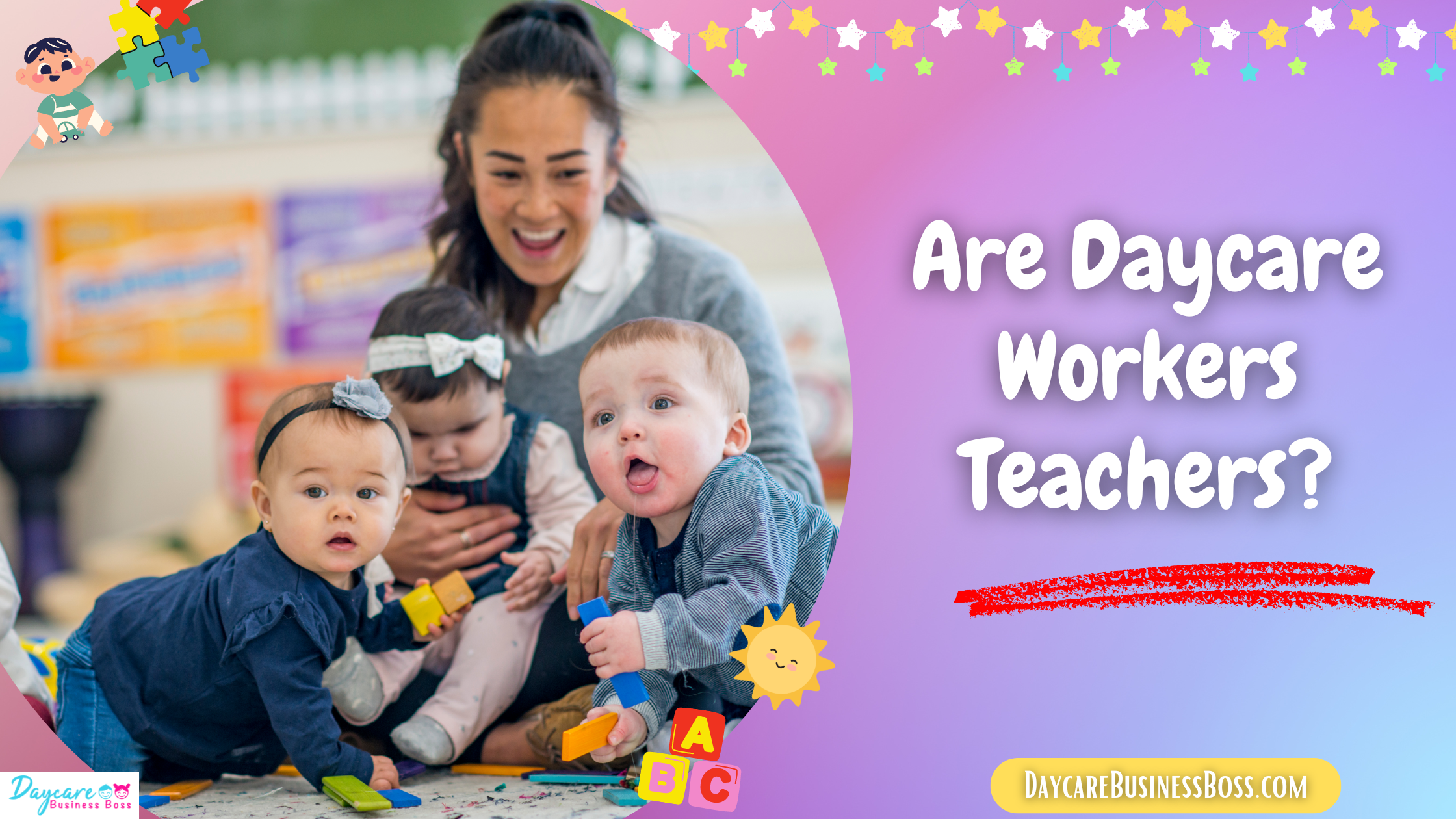When you hear other parents talk about their child’s daycare, you’ll often hear them refer to the childcare workers as “teachers.” This is typically shorthand to avoid confusion in casual conversation. And let’s face it, it’s easier to tell a small child to be good for their teacher than it is to tell them to be good for their early childcare professional or another jargon term that they have no chance of understanding. But it does raise the question:
Are daycare workers teachers?
The answer is typically no daycare workers are not teachers.
• Teachers typically have more training
• Teachers have teaching degrees/licenses
• The responsibilities of the two tend to be different
The Similarities Between the Two
It is no accident that a lot of parents and daycare workers call daycare workers teachers. There are many similarities. Both professionals are in charge of children. Both are in charge of making sure the children are safe and that they follow rules. Teachers and daycare workers have to report signs of trouble to parents. No daycare worker or teacher worth anything is disorganized. Particularly when dealing with young children who need to see them as authority figures. They have to have some form of lesson plan on most days. Even if that lesson plan is to show an educational movie.
Teachers and daycare workers alike have to teach children interpersonal skills. At daycare and school, kids learn how to resolve disputes without fighting, play games fairly, and follow instructions. Teachers that teach young children (for this article, young children means kids in kindergarten to 3rd grade) also impart these lessons.
Many people believe that anyone who teaches kids a lesson, like parents, teachers, or even sports could be considered a teacher. There may be some truth to that in a philosophical sense. But in the legal sense, a daycare worker isn’t a teacher. And the legal sense is what matters here.
Teachers Have More Training
With a few exceptions, teachers have more training than daycare workers. Provided a prospective daycare worker can pass a background check and handle working with children, the most they tend to need is a high school diploma. There are exceptions to this rule. Many daycares geared towards upper-class parents or parents of children with special needs may require daycare workers to have a degree in Early Childhood Education. While the majority of states accept a high-school diploma as sufficient for becoming a daycare worker, some states require that a daycare worker get a Bachelor’s Degree in Early Childhood Education. If you are aspiring to be a daycare worker or to run a daycare, you should look to see what your state requires.
Teachers on the other hand are required to have a Bachelor’s Degree or a teaching certificate from an accredited institution. Daycare workers who seek to transition to becoming actual teachers may seek this path in place of a four-year degree. While it could be easier, people aspiring to transition should be careful. Many “schools” offering teaching certificates aren’t accredited. While the government has been cracking down on fraudulent diploma and certificate mills, the work isn’t done yet. As such, you should research an institution carefully before registering for anything.
It is worth noting that a person with a degree in Early Childhood Education can become a teacher if they are applying to teach kids in kindergarten to third grade. That may depend on your state. Most states require you to have completed a teacher preparation program. If you went for a Bachelor’s Degree in teaching, the preparation program was built-in. If you chose alternative paths, you’ll have to complete a teacher preparation program. It is best to research the requirements if you intend to use an Early Childhood Education degree to become a teacher.
Licensing

Another thing teachers have over daycare workers is an actual teaching license. Again, most daycare workers tend to just have a high school diploma and usually, they’re set. However, teachers require not only degrees but licensing.
The ease of getting a license can vary depending on what state you’re in. Some states want teachers to shadow or assist other teachers in a live classroom. Others may just have you take an exam. In either case, passing a background check is a requirement.
Another major thing that teachers typically have over daycare workers is having to continue their education. As part of renewing a license, teachers have to take classes and attend seminars to keep their licenses up to date. What classes a teacher needs to take may vary depending on the state and the trends in education at the time. These courses are usually taken over the summer. There are instances where daycare workers may also need to take classes as part of a requirement to work at an individual daycare or to get a license in a state with more stringent requirements.
Teachers Have Different Responsibilities
One of the things separating teachers and daycare workers is their responsibilities. Compare a daycare to an average preschool classroom. In a daycare, the daycare workers are usually taking care of a vast range of children, usually anywhere from infants to early elementary school students. Many daycares, in-home daycares especially, don’t separate the kids based on age the way preschools are. This vast range of ages can make it hard to do anything beyond the most basic educational activities. Usually, daycares are tasked with making sure the children’s basic needs are met and that they have constructive things to do during the day. A childcare worker is typically best for situations where basic needs, rather than academics, are the main concern.
This isn’t to say that daycare workers are glorified babysitters. Much like teachers, daycare workers have lesson plans. That lesson plan may contain different things. A daycare worker’s lesson plan may contain lessons on making friends or taking turns. Sometimes, particularly with babies and toddlers, daycare workers are more focused on teaching fine motor skills. Things like learning to crawl and walk, picking up toys, and learning to use the bathroom.
Additionally, daycare workers are typically tasked with getting children prepared for preschool or kindergarten. Many states often list that as a requirement. In addition to motor skill basics, daycare workers will try to teach numbers, letters, and anything else that will set children up for success once they enter school. Often, the lessons are more fun and playful.
In contrast, a teacher’s lesson plan, though there is often room for fun, tends to be a bit more focused on academics. Barring a disability of some kind, there is also more of an expectation that kids have basic skills that allow them to function in the classroom. A kindergarten teacher in a regular education classroom can’t take a child aside to change a diaper for example and toilet training is often a requirement to enter a preschool or kindergarten.
There’s also the matter of hours. Most preschools are only active during school hours and usually, the kids are there during that time. Many daycares offer more flexible hours, sometimes well into the evening.
Find out more about the duties of a daycare worker HERE
Teachers Can Work at Daycares
There are cases where someone with a teaching license can find good work at a daycare. Many, daycares are increasingly seeing older children being enrolled in daycares. If you want to start a daycare with room for older children or you’re looking to work at one, there are some things to look for.
In areas where daycares are aimed at older children, you usually find that schools have cut back on things like afterschool activities. Thanks to the hysteria around kidnappings, the days of the latchkey kid are over. People don’t want to leave their kids home alone and prefer them to be under adult supervision. In some cases, older kids may go to daycare because their neighborhood is unsafe. Parents may not trust that their child will stay out of trouble and away from the various bad influences such as street gangs that often prey on preteens. Other parents just want to make sure their kid is doing something besides playing video games when they get home from school.
Many daycares that serve older children often have tutoring services to help kids with homework or catch up if they have fallen behind in school. Teachers looking for work over the summer break have often turned here.
Related Questions

1. Do traditional teachers get mad if daycare workers call themselves teachers?
That depends on the teacher. Most teachers are respectful about it and understand that calling daycare workers teachers is convenient shorthand but some will try to correct you. In their view, calling a daycare worker a teacher is disrespectful to all the work they did to get and maintain their teaching licenses.
2. What would I need if I wanted to start a daycare with a tutoring service?
You would need a quiet space for the kids to work and you would need a few extra staff members dedicated to the tutoring program. It can be hard for kids to concentrate in areas full of crying babies. You would need a dedicated tutoring staff because it’s hard to help older kids when you constantly have to be dragged off to help with the younger ones.
Please note: This blog post is for educational purposes only and does not constitute legal advice. Please consult a legal expert to address your specific needs.
To learn more on how to start your own daycare checkout my startup course and documents here.

Meet Shawn Chun: Entrepreneur and Childcare Business Fan.
I’m a happy individual who happens to be an entrepreneur. I have owned several types of businesses in my life from a coffee shop to an import and export business to an online review business plus a few more and now I create online daycare business resources for those interested in starting new ventures. It’s demanding work but I love it. I do it for those passionate about their business and their goals. That’s why when I meet a childcare business owner, I see myself. I know how hard the struggle is to retain clients, find good employees and keep the business growing all while trying to stay competitive.
That’s why I created Daycare Business Boss: I want to help childcare business owners like you build a thriving business that brings you endless joy and supports your ideal lifestyle.


1 thought on “Are Daycare Workers Teachers?”
Comments are closed.